Serving 298 students in grades Prekindergarten-8, Elm City Montessori School ranks in the bottom 50% of all schools in Connecticut for overall test scores (math proficiency is bottom 50%, and reading proficiency is bottom 50%).
The percentage of students achieving proficiency in math is 25-29% (which is lower than the Connecticut state average of 40%). The percentage of students achieving proficiency in reading/language arts is 45-49% (which is lower than the Connecticut state average of 50%).
Minority enrollment is 65% of the student body (majority Hispanic), which is higher than the Connecticut state average of 53% (majority Hispanic).
Quick Stats (2025)
- School Type: Charter School
- Grades: Prekindergarten-8
- Enrollment: 298 students
- Minority Enrollment: 65%
- Overall Testing Rank: Bottom 50% in CT
- Math Proficiency: 25-29% (Btm 50%)
- Reading Proficiency: 45-49% (Btm 50%)
- Science Proficiency: 40-59% (Top 50%)
- Source: National Center for Education Statistics (NCES), CT Dept. of Education
Top Rankings
Elm City Montessori School ranks among the top 20% of public schools in Connecticut for:
Category
Attribute
Diversity
School Overview
Elm City Montessori School's student population of 298 students has grown by 49% over five school years.
School Type
Grades Offered
Grades Prekindergarten-8
(offers virtual instruction)
(offers virtual instruction)
Total Students
298 students
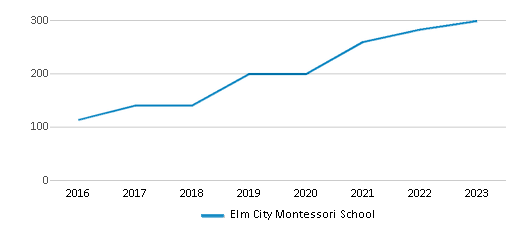
Gender %
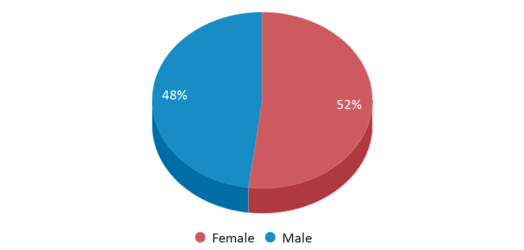
Total Classroom Teachers
1 teacher
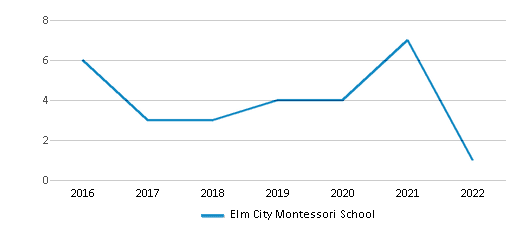
Students by Grade
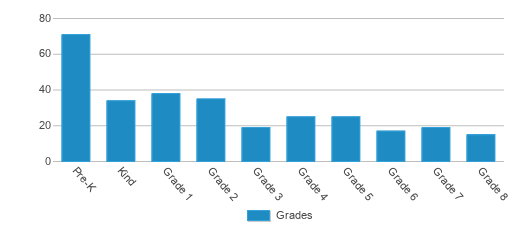
School Calendar
School Rankings
Elm City Montessori School ranks within the bottom 50% of all 942 schools in Connecticut (based off of combined math and reading proficiency testing data).
The diversity score of Elm City Montessori School is 0.73, which is more than the diversity score at state average of 0.68. The school's diversity has stayed relatively flat over five school years.
Overall Testing Rank
#606 out of 942 schools
(Bottom 50%)
(Bottom 50%)
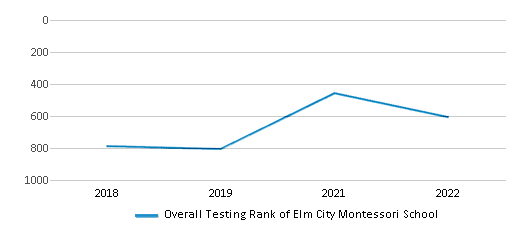
Math Test Scores (% Proficient)
25-29%
40%
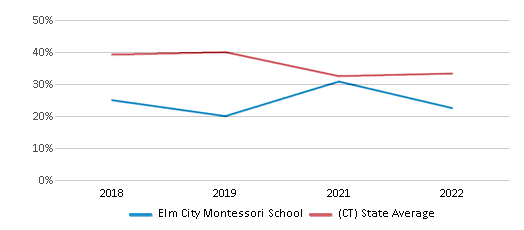
Reading/Language Arts Test Scores (% Proficient)
45-49%
50%
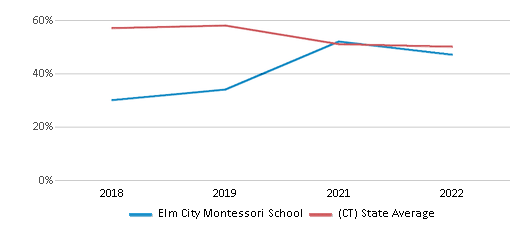
Science Test Scores (% Proficient)
40-59%
47%
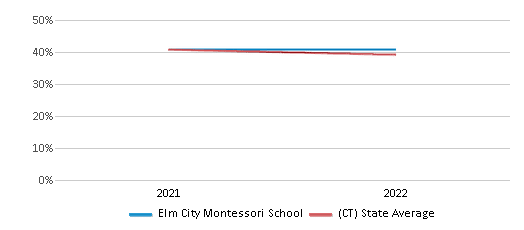
Student : Teacher Ratio
n/a
12:1
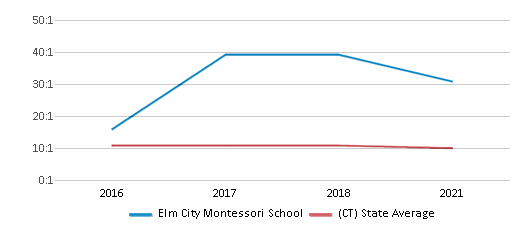
American Indian
n/a
n/a
Asian
3%
5%
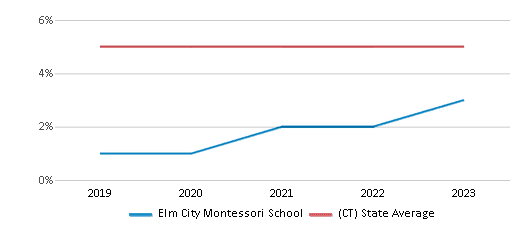
Hispanic
30%
31%
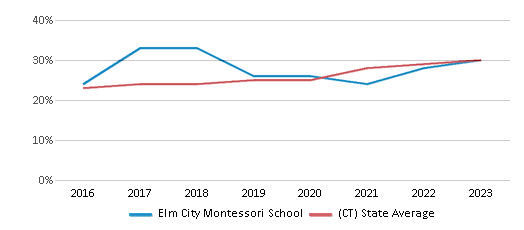
Black
24%
12%
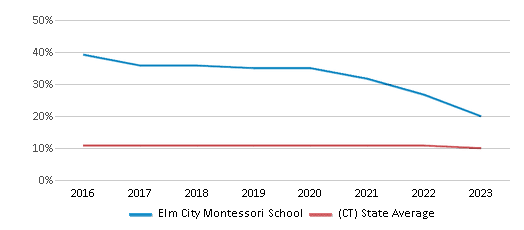
White
35%
47%
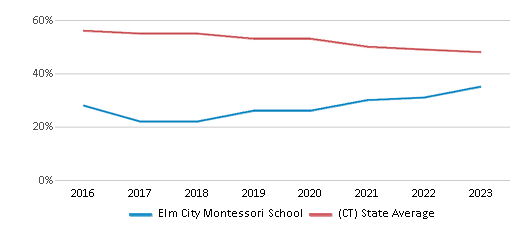
Hawaiian
n/a
n/a
Two or more races
8%
5%
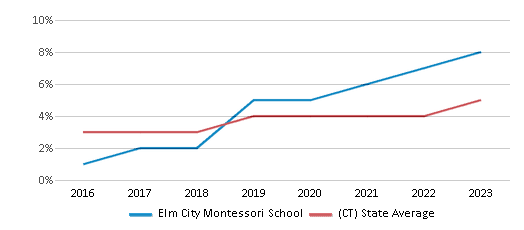
All Ethnic Groups
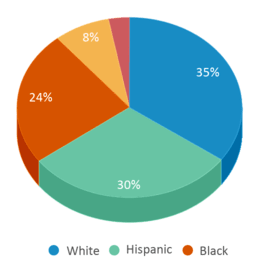
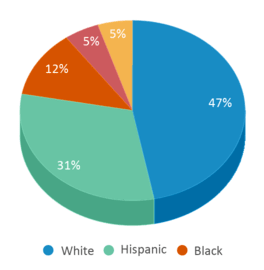
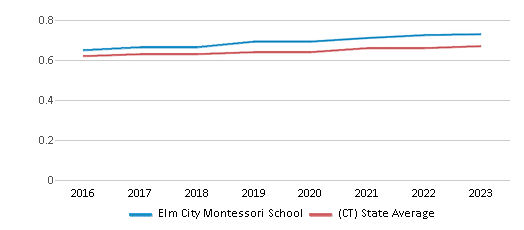
Eligible for Free Lunch
40%
37%
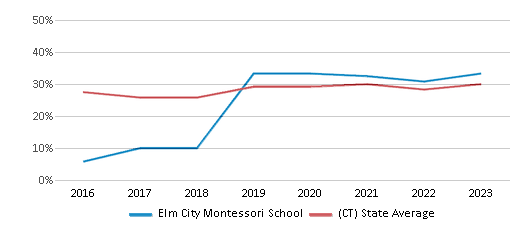
Eligible for Reduced Lunch (21-22)
5%
6%
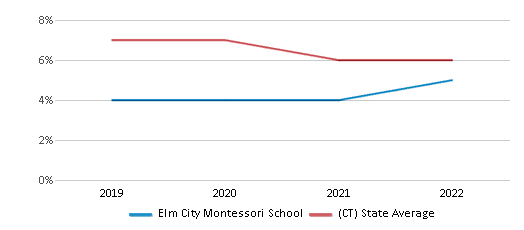
School Statewide Testing
School District Name
Extracurriculars
Total ExtracurricularsTotal Extra-curric.
3 extracurriculars
ExtracurricularsExtra-curric.
Club or Organization:
Gay Straight Alliance, SEL Student Mentors, Student Union
Gay Straight Alliance, SEL Student Mentors, Student Union
Source: National Center for Education Statistics (NCES), CT Dept. of Education
Profile last updated: 02/09/2025
Frequently Asked Questions
What is Elm City Montessori School's ranking?
Elm City Montessori School is ranked #606 out of 942 schools, which ranks it among the bottom 50% of public schools in Connecticut.
What schools are Elm City Montessori School often compared to?
Elm City Montessori Schoolis often viewed alongside schools like Beecher School, Barnard Environmental Magnet School by visitors of our site.
What percent of students have achieved state testing proficiency in math and reading?
25-29% of students have achieved math proficiency (compared to the 40% CT state average), while 45-49% of students have achieved reading proficiency (compared to the 50% CT state average).
How many students attend Elm City Montessori School?
298 students attend Elm City Montessori School.
What is the racial composition of the student body?
35% of Elm City Montessori School students are White, 30% of students are Hispanic, 24% of students are Black, 8% of students are Two or more races, and 3% of students are Asian.
What grades does Elm City Montessori School offer ?
Elm City Montessori School offers enrollment in grades Prekindergarten-8 (offers virtual instruction).
What school district is Elm City Montessori School part of?
Elm City Montessori School is part of Elm City Montessori School District.
In what neighborhood is Elm City Montessori School located?
Elm City Montessori School is located in the West Rock neighborhood of New Haven, CT. There are 3 other public schools located in West Rock.
School Reviews
1 3/26/2020
My child isn't learning. Montessori isn't Montessori if the teachers aren't Montessori trained. Having all the materials are great, but what's the point if the teachers aren't trained on how to use the materials. How can my child learn in a Montessori environment like that? Sadly disappointed and the public test scores reflects half of their students aren't at grade level. How disappointing to have so much money go to a wonderful ideology of a curriculum but they can't execute the fact that students aren't actually learning? Test scores don't lie people, such a waste. It would be great if your child is 3-4 and do not want to pay or can't afford a daycare. That would be the only good thing I have to say. I will not allow my child to fail. Smh.
5 7/6/2015
My name is aliciah farrior and I am applying for this school because I've been working very hard and I've made a lot of growth in my reading and math scores and have been trying to get into a better school
Review Elm City Montessori School. Reviews should be a few sentences in length. Please include any comments on:
- Quality of academic programs, teachers, and facilities
- Availability of music, art, sports and other extracurricular activities
Recent Articles

What Is A Charter School?
Explore the world of charter schools in this comprehensive guide. Learn about their history, how they operate, and the pros and cons of this educational innovation. Discover key facts about charter schools, including admission policies, demographics, and funding, as well as what to look for when considering a charter school for your child.

10 Reasons Why High School Sports Benefit Students
Discover the 10 compelling reasons why high school sports are beneficial for students. This comprehensive article explores how athletics enhance academic performance, foster personal growth, and develop crucial life skills. From improved fitness and time management to leadership development and community representation, learn why participating in high school sports can be a game-changer for students' overall success and well-being.

February 05, 2025
Understanding the U.S. Department of Education: Structure, Impact, and EvolutionWe explore how the Department of Education shapes American education, from its cabinet-level leadership to its impact on millions of students, written for general audiences seeking clarity on this vital institution.







